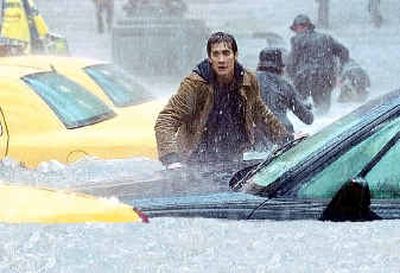Worst kind of weather

It’s the day after tomorrow, and the weather has just been hell.
Actually, it’s been apocalyptic.
There’s a blizzard in India. Hail the size of softballs in Japan. A tidal wave headed for Manhattan.
And it’s only going to get worse.
At least, that’s the weather forecast in Roland Emmerich’s “The Day After Tomorrow,” a bit of eco-fiction that warns that global warming has become so bad it’s about to bring on a new ice age.
The exact “how” of that paradox is a little confusing – even with scientists Dennis Quaid and Ian Holm delivering pages of expository dialogue. Apparently, though, this great thaw is melting the polar ice caps, which are then changing the salinity of the Atlantic Ocean, which is then re-directing the Gulf Stream, which is then …
Oh, what do you care?
If you’re one of the dedicated environmentalists busy handing out leaflets by the theater, OK, undoubtedly quite a bit. If, however, you’re a typical summer moviegoer, what you probably really care about is how much you’re going to enjoy watching “The Day After Tomorrow.” Will you leave the theater happy you bought a ticket?
The outlook is cloudy.
As a purely visual spectacle, “The Day After Tomorrow” has its rewards. There’s an icequake in the Arctic and tornadoes in Los Angeles. In the film’s most elaborate – and unsettling – sequence, most of Manhattan is flooded. As an even vaguely plausible bit of science fiction, though, the movie is slightly more problematic. Although our hot-shot scientist hero first says the scenario might unfold over 100 years – even 1,000 – in the script it seems to take less than a week. The disasters aren’t just cataclysmic but practically instantaneous, with the ice age literally chasing our heroes down the block.
As a drama – well, the picture’s a mess, crammed full of disaster-movie cliches and cardboard characters.
Some of this is kind of amusing, in a bad-movie kind of way. (And certainly worth a smirk is the way that every television in this Fox movie seems to be perpetually tuned to Fox News.) But there’s precious little real humor, and Emmerich directs the life out of almost every scene he touches.
That may seem surprising, at first – how could an end-of-the-world movie not be dramatic? But the problem is, we’re told early on that this climatic change is inevitable and that there’s nothing the scientists can do but sit, and observe, and wait for the end. And so there’s nothing for us to do but join them.